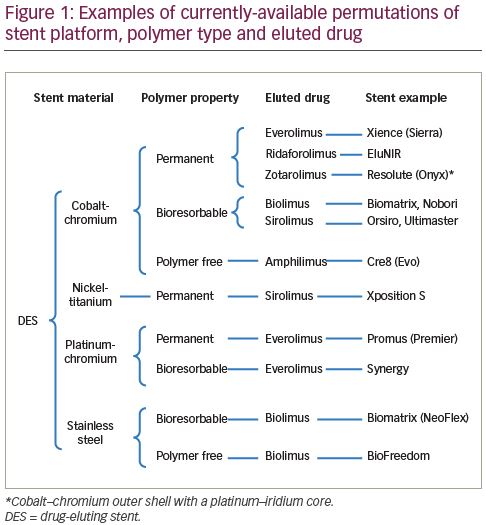
New Generation Coronary Stents. This is a new coronary stent based on Amphilimus a sirolimus formulated with a polymer-free amphiphilic carrier released from reservoirs machined onto the abluminal stent surface. Innovations developed to overcome the limitations of prior generations of stents include biodegradable polymer stents drug-eluting stents without a polymer and bioabsorbable scaffolds. Newer stents attempt to further lower the already low long-term risks of stent thrombosis and restenosis seen with current-generation DES see Everolimus- versus zotarolimus-eluting stents below. As our experience with the next generation of bioabsorbable scaffolds grows it will be essential to continue long-term follow-up to assess whether newer-generation coronary stents will supplant current everolimus-eluting DES that have dominated modern-day PCI and potentially surgical revascularization in patients with multivessel coronary disease if very late stent thrombosis and late.

Innovations developed to overcome the limitations of prior generations of stents include biodegradable polymer stents drug-eluting stents without a polymer and bioabsorbable scaffolds. Bioabsorbable scaffolds have not demonstrated better outcomes than current standard treatment with second-generation drug-eluting stents but have showed a concerning signal of late and very late stent thrombosis. Few reports have primarily focused on long-term clinical outcomes in three-vessel disease when patients were treated with either first- or new-generation drug-eluting stents DES. The purpose of this study was to investigate the safety and efficacy of new-generation drug-eluting stents DES versus early-generation DES in women undergoing complex percutaneous coronary intervention CPCI. Everolimus-eluting stents have the most favorable outcomes in terms of safety as well as efficacy in patients undergoing percutaneous coronary intervention. Percutaneous coronary intervention PCI is 40 years old this year.
As our experience with the next generation of bioabsorbable scaffolds grows it will be essential to continue long-term follow-up to assess whether newer-generation coronary stents will supplant current everolimus-eluting DES that have dominated modern-day PCI and potentially surgical revascularization in patients with multivessel coronary disease if very late stent thrombosis and late.
However data for long-term safety and efficacy from randomised studies of new generation drug-eluting coronary stents. Few reports have primarily focused on long-term clinical outcomes in three-vessel disease when patients were treated with either first- or new-generation drug-eluting stents DES. From its humble beginnings of experimental work PCI has transitioned over years with coronary artery stenting now a standard medical procedure performed throughout the world. This is a new coronary stent based on Amphilimus a sirolimus formulated with a polymer-free amphiphilic carrier released from reservoirs machined onto the abluminal stent surface. Test Efficacy of Sirolimus- and Probucol-Eluting Versus Zotarolimus- Eluting Stents ISAR-TEST 5 trial is one of the largest clinical trials involving new-generation drug-eluting stents. 15 In comparison with first-generation DES contemporary.